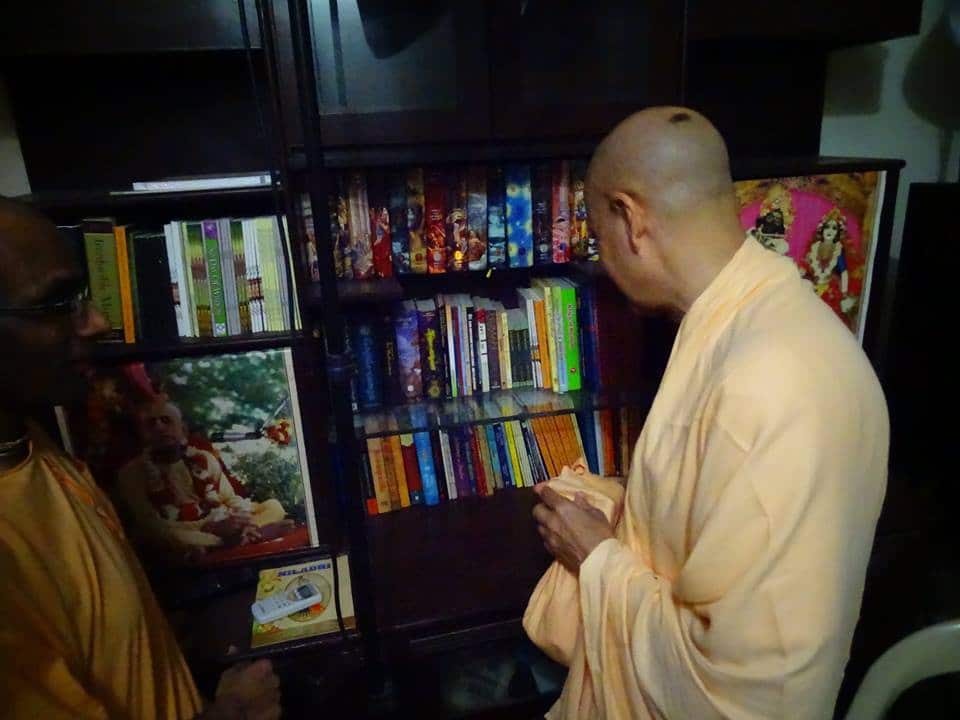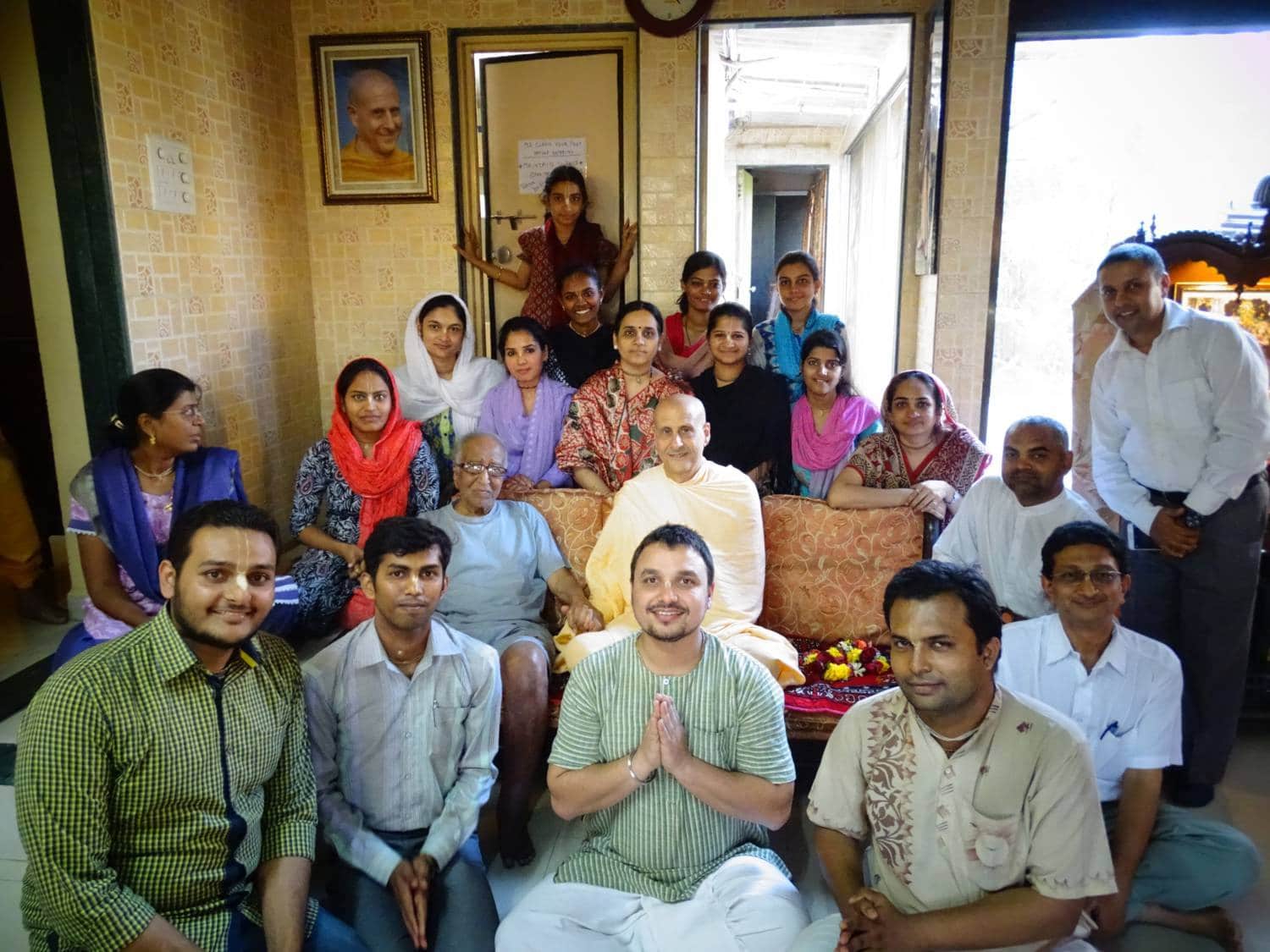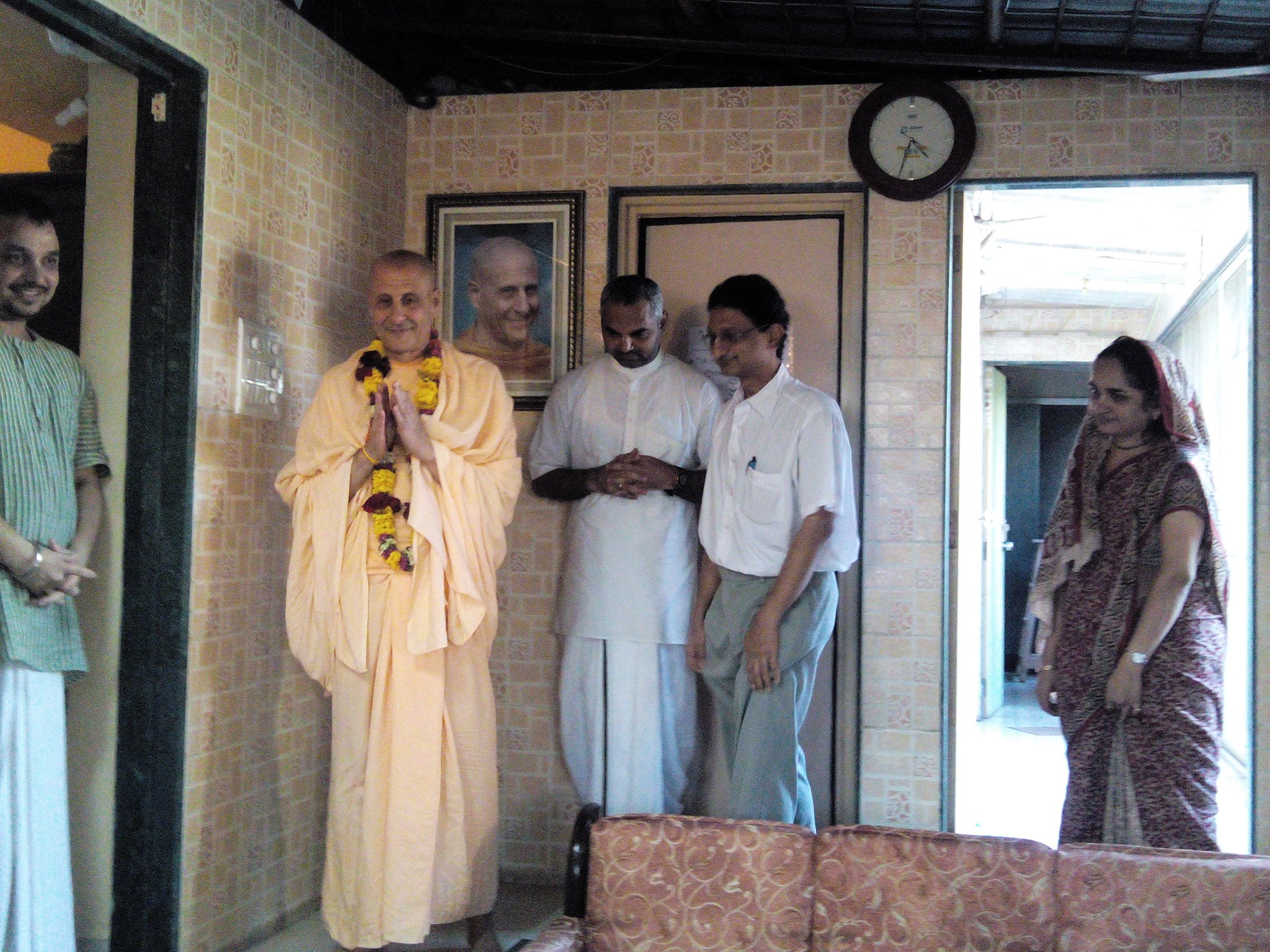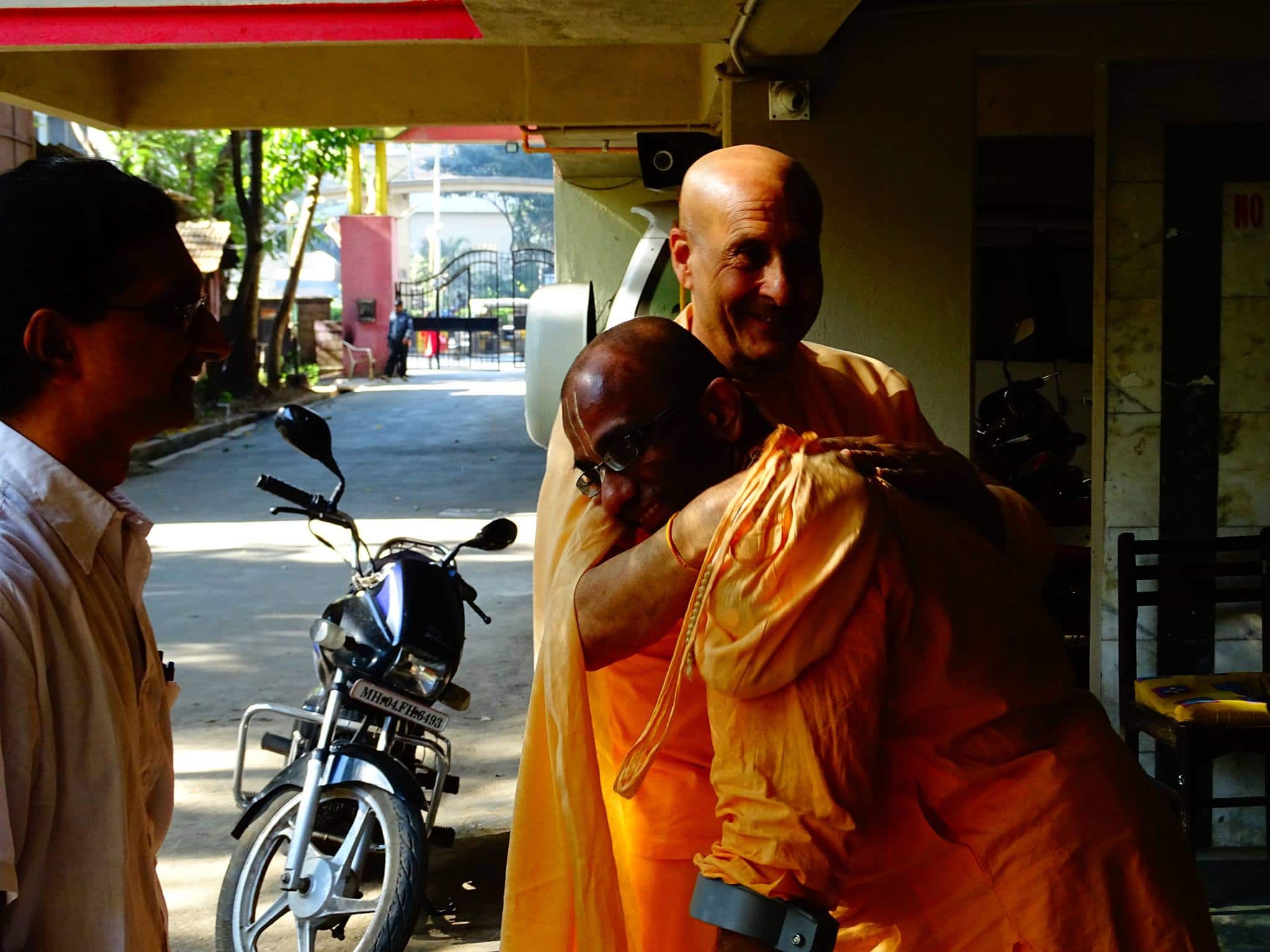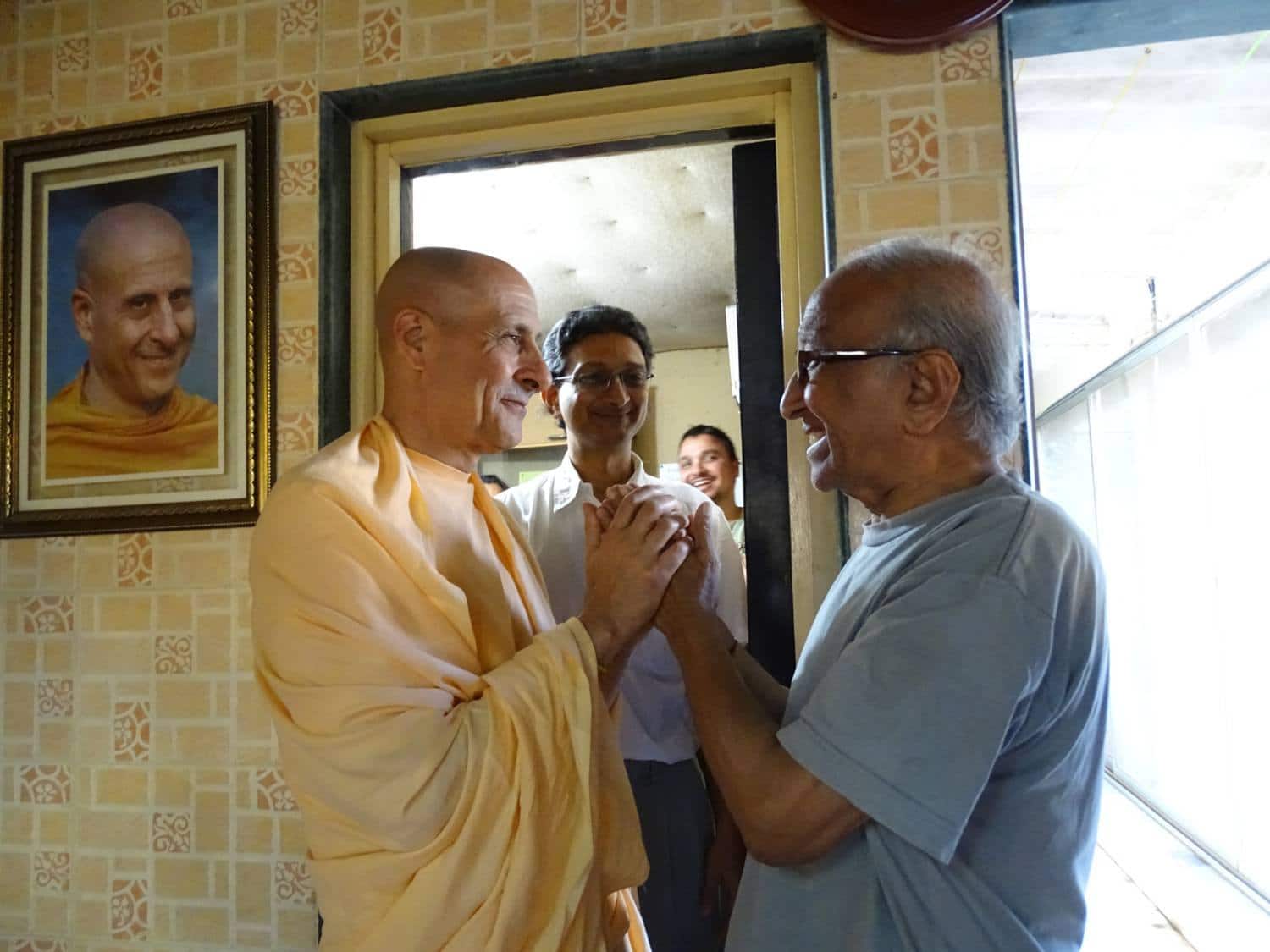A giant desire tree blesses ISKCON desire tree
On the afternoon of 4th February, 2016, HH Radhanath Maharaja visited ISKCON desire tree (IDT).
A treasury of memory
He first came to the flat where I do video recordings – I think of it as my digital bhajan kutir. When he saw a picture of Srila Prabhupada in the studio, he immediately said, “This is from New Vrindavan. It was in 1972, Kirtananada Maharaja was near Prabhupada and I was there too, standing where you are.” He pointed to where I was standing. Looking closely at the picture and then at me, he said, “No, I was not that close. I was where Vaishnava Seva Prabhu is.” He pointed to a spot a couple of feet away. Maharaja gazed at the picture for several long moments – it was clear that he was in a different world.
As I was observing Maharaja, another similar incident flashed through my mind. A few months ago when I had met Giriraja Maharaja in America, I had given him my book Prabhupada: The moments that made the movement. On seeing some of the pictures of Srila Prabhupada in that book, He too had become momentarily lost in devotional absorption.
It struck me that Srila Prabhupada’s disciples have a treasury that we his grand-disciples don’t. They have such rich memories of Prabhupada, something that we can relish only as long as they are still with us on this planet. After that, we will be bereaved of that great treasure of personal memories of the person who has changed the course of Vaishnava history.
As Maharaja turned to leave, he again turned back to the picture and said to me, “I helped make that vyasasana which Prabhupada was sitting on. It was 1972, and I was not even initiated – I hadn’t even shaved my hair. But I got to help in making that vyasasana, and Prabhupada sat on it every day when he gave class. After that, it was taken to the bramachari ashram and used there for many years.”
As we left the flat, Maharaja asked me about my realizations from my US visit. As we had just started speaking, we reached the IDT office, and our discussion was cut short.
“Even I am inspired by Vaishnava Seva Prabhu’s dedication”
IDT office is actually the same as Vaishnava Seva Prabhu’s home. He has taken two adjacent flats and merged them into an improvised office. He is a respected surgeon, Dr Bimal Shah, specializing in laproscopic surgery and heading the Department of Laproscopic Surgery at the Bhaktivedanta Hospital in Mira Road, Mumbai. His wife Dr Kshama Shah (Kalindi Mataji) is chief anesthesiologist at the same hospital. Both of them stay in just one room and his father stays in another room. He keeps a guest room for visiting devotees, usually those who want to recuperate after treatment at the Bhaktivedanta Hospital. The rest of the home is used as workspace for over a dozen employees.
From this inconspicuous base has issued a gigantic digital outreach of Krishna’s message. Iskcondesiretree.com has 23.000 members and over 11,000 unique daily visitors. The reach is spread further through over 70 sites and over 100 apps. From audio.iskcondesiretree.com, 7000 audio files are downloaded daily. And IDT’s youtube channel is viewed for 120,000 minutes daily.
Maharaj entered IDT office and sat on a sofa. Vaishnava Seva Prabhu outlined briefly the history of IDT starting with how decades ago he had been doing audio recording of Maharaja’s classes and handling the tape ministry, library and sound system in Radha Gopinath temple. Maharaja nodded and, speaking to everyone, appreciated Vaishnava Seva Prabhu’s commitment and versatility, saying that he is not just a high-class surgeon, but also an architect – he designed and oversaw the building of the Bhaktivedanta Hospital. Maharaja turning to Vaishnava Seva Prabhu said that we discussed what color the building should be and what kind of windows we should have. Maharaja appreciated him, saying that it’s amazing that he is able to do so much in twenty-four hours.
Vaishnava Seva Prabhu, pointing to his wife, said, “Due credit for whatever I have done goes to my better half too.” Maharaja nodded and smilingly said, “I was going to say that, but I was waiting for you to say that. It is more appropriate if you acknowledge that rather than I tell you that.”
As everyone laughed, Kalindi Mataji humbly said, “Maharaja, this is what I can do; I cannot preach like other Matajis, but I can do this small service.” Maharaja replied, “This is not a small service; it is a huge service.”
During his subsequent talk addressed to everyone assembled there, Maharaja said, “All over the world people tell me that they get lectures from ISKCON desire tree. I travel all over the world spending so much time and energy, but I can’t reach as many people with all that traveling as you can reach just by pressing a few buttons.”
After a moment’s thought, he added, “Even what I speak can’t reach as many people by my traveling as it can by your pressing a few buttons – you are all doing a very valuable service.”
Thereafter, Maharaja aptly and insightfully expanded on the name ISKCON desire tree. Sometimes, some names become so integrated into our functional vocabulary that we overlook their transcendental import. That’s what had happened to me with respect to the name ISKCON desire tree, I realized while hearing Maharaja’s talk. Maharaja spoke, “Every tree begins with a tiny seed, and as it is nourished, it grows and finally gives fruits. ISKCON desire tree started as a small seed in the recording space at Radha Gopinath temple, and from that seed now it has grown so big that it is giving thousands of fruits, millions of fruits, unlimited fruits, to people all over the world.”
After speaking for a few minutes, he brought his talk to a beautiful conclusion: “Lord Chaitanya when he was in Varanasi said that he had so many fruits of love of God to distribute, but had only two hands to distribute them, so he needed helping hands. All of you are his helping hands, assisting Lord Chaitanya and Srila Prabhupada in distributing those fruits.”
When his talk ended, I mentioned to Maharaj, “Vaishnava Seva P is not just funding and facilitating IDT – he is also pioneering it. Whenever any new technological initiative comes up, he is in the forefront, learning it himself first, then teaching it to his staff. That’s how he diversified from audios to videos and recently to mobile apps. He works all day as a surgeon and late into the night for IDT. He is so dedicated that although I am a brahmachari, I am inspired by his dedication.” Maharaja smiled and replied, “I am a sannyasi and I too am inspired by his dedication.”
After Maharaja’s talk, when Vaishnava Seva Prabhu was leading Maharaja to a small video studio inside his house, I mentioned to Maharaja that I had recorded 75 lectures on the Mahabharata here. Intrigued, Maharaja said, “75 lectures?” and followed Vaishnava Seva Prabhu inside. On seeing the four tiny rooms, Maharaja turned to me and asked, “Where did you record those 75 classes?” When Vaishnava Seva Prabhu pointed to the place, Maharaja immediately realized that the room was too small for anyone else to be sitting with the camera. So he asked me, “You sit alone in front of a camera and speak?” When I nodded, Maharaja said, half-jokingly, “I can’t speak in front of a camera; I become speechless. You are sitting in one small room and are reaching out to so many people.”
When Maharaja was leaving, he remembered and asked me about my US trip. But his secretary had earlier told me that Maharaj had to go for another meeting. So I told Maharaj that as I didn’t want to delay him, I would work out with his secretary the time for a meeting later. Maharaj nodded, embraced me and said, “You are doing such amazing service. I am proud of you.”
Affection beyond affliction
While Maharaja’s words were certainly memorable for me, the most revealing and edifying part of his visit was his conversation with Vaishnava Seva P’s father (I will refer to him as Mr Shah). He is afflicted with dementia, and has periods of lucidity that alternate with phases of incoherence. Maharaja’s visit was a period of lucidity, though there were a few moments of incoherence in between. Yet Maharaja treated him with respect and attention throughout.
After seeing IDT, when Maharaja was about to leave, Mr Shah suddenly spoke out loud, “I once fought with you.” As several of the devotees gasped at the outburst, Maharaja turned around, peered at Mr Shah and returned to his seat. Mr Shah continued, “I had a verbal fight with you when he (pointing to Vaishnava Seva P) left me to go to you. Do you remember?” Maharaja replied, “Yes, I remember. That was a natural expression of your affection for your son. So I respected it.” After a pause, Maharaja added, “I didn’t agree with it, but I respected it.”
Mr Shah then reminisced several defining incidents in his life, including the time when he had a bypass surgery. At that time, Maharaj, Mr Mafatlal (Krishna Chandra Prabhu) and Mr Desai (Srinathaji Prabhu) had come to see him in the hospital. Vaishnava Seva Prabhu, who was giving us a running commentary to his father’s recollections, elaborated, “Those visits changed his attitude – he started feeling that devotees really cared for him.”
After a brief pause, Mr Shah told Maharaja, “Although I fought with you once, now I like you. You know why?” Maharaja remained silent and shook his head slightly. Pointing towards his son, Mr Shah said, “Because you changed him.”
After mentioning a few other incidents, Mr Shah suddenly said, “My memory is very sharp. Be careful.” Maharaja replied with gravity in his voice and joviality on his face: “Yes, I will be very careful.”
After a few moments of silence, Mr Shah said, “I am a Jain, but I appreciate Vaishnavism.” Maharaja nodded, “Therefore, you are a Vaishnava, and he (pointing to Vaishnava Seva P) is Vaishnava Seva. I am proud of the way he is taking care of you.”
While Mr Shah was speaking, intelligibly but disconnectedly, jumping from one incident to another, Maharaja gave him his full attention, as if he had all the time in the world. Finally, Vaishnava Seva Prabhu mentioned discreetly to his father that Maharaja had to leave. After his father nodded, Vaishnava Seva Prabhu intimated to Maharaja. Maharaja got up, went to Mr Shah, gave him another tight, long embrace and said, “I am honored to spend time with you.”
I had known that Maharaja always values relationship more than projects. It’s not that he undervalues projects – the many projects that he has inspired are testimony to his commitment to offering doing wonderful projects in Srila Prabhupada’s service. But he keeps relationships at an appropriately high priority. This became evident when he said, “I am proud of your son for the way he is taking care of you.” I found it sobering that Maharaja didn’t say, “I am proud of him for pioneering IDT.” IDT might seem to be a far more special and glorious project than taking care of one’s ailing father, and Maharaja is definitely pleased with the IDT service, as was evident from his earlier talk. But Maharaja’s statements underscored that while doing big things in Krishna’s service, we shouldn’t neglect the ordinary things that define us as human beings and as devotees.
Maharaja has won the hearts of thousands, if not millions, all over the world because of his capacity to connect at the level of the heart with people. That is not a skill we get genetically or learn by some self-help training. We can form heart-to-heart connections with others only when we have genuine respect and concern for them. And Maharaja has always had that in abundance, even from his pre-devotional days.
I remembered an incident during his spiritual search. A sadhu had served spicy khichadi to Maharaja (then Richard Slavin). Although the chili in it was burning him from within, he not only finished all of that khichadi but also accepted a second helping when offered – just to not hurt the feelings of that sadhu.
I also remembered how, during a Pune yatra many years ago, HH Devamrita Maharaja had said, “What amazes me about Radhanatha Maharaja is his ability to maintain so many loving relationships.” I gained a deeper understanding of that appreciation when I meditated how Maharaj had so affectionately and respectfully connected with a person whose affliction would have normally made anything beyond basic greeting difficult.
Vaishnavas are desire trees. Advanced Vaishnavas such as Radhanatha Maharaj are like giant desire trees. I felt grateful to have had the opportunity to behold the pastime of a giant desire tree blessing ISKCON desire tree.

